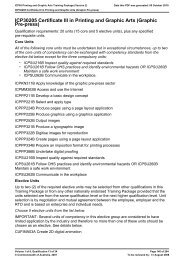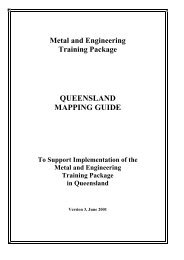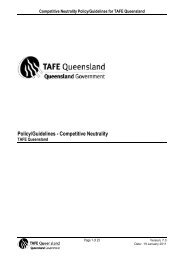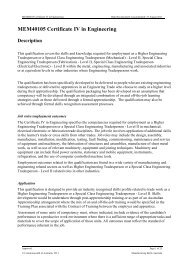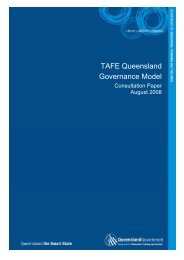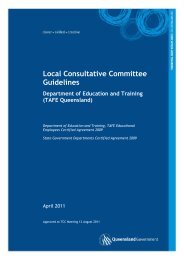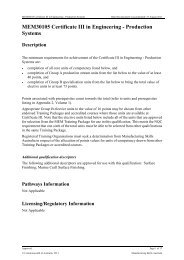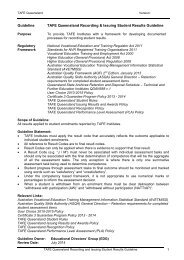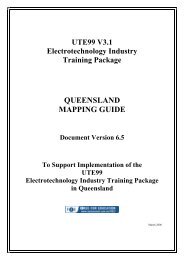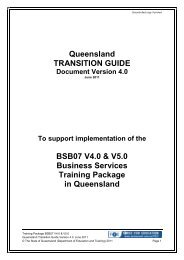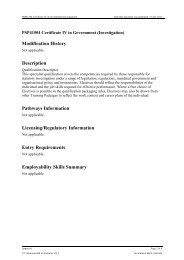The Crux of the Matter - Training Queensland - Queensland ...
The Crux of the Matter - Training Queensland - Queensland ...
The Crux of the Matter - Training Queensland - Queensland ...
You also want an ePaper? Increase the reach of your titles
YUMPU automatically turns print PDFs into web optimized ePapers that Google loves.
Tip 9: Identifying LLN skills <strong>of</strong> <strong>the</strong> learner<br />
When a person participates in on-<strong>the</strong>-job training,<br />
signs up for an apprenticeship, or enrols in a<br />
vocational course, it is useful for you to have an<br />
indication <strong>of</strong> whe<strong>the</strong>r <strong>the</strong>y have <strong>the</strong> underpinning<br />
LLN skills to engage in, and successfully complete<br />
<strong>the</strong> training. However, <strong>the</strong>re is no single measure<br />
<strong>of</strong> LLN that can denote competency in a particular<br />
situation. An adult may be perfectly literate in one<br />
situation but struggle to communicate in ano<strong>the</strong>r.<br />
Adults display a wide variety <strong>of</strong> skills that reflect<br />
<strong>the</strong>ir life experiences. LLN skills should only be<br />
assessed in relation to <strong>the</strong> context <strong>of</strong> <strong>the</strong>ir use.<br />
Working out <strong>the</strong> LLN skills <strong>of</strong> a learner requires some<br />
form <strong>of</strong> appraisal, not necessarily formal or test<br />
based. Deciding on <strong>the</strong> purpose for <strong>the</strong> appraisal will<br />
assist you to choose <strong>the</strong> most suitable options.<br />
Effective working relationships are essential.<br />
Whe<strong>the</strong>r you are a teacher, trainer or assessor, a LLN<br />
specialists, a manager or learning support <strong>of</strong>ficer,<br />
working toge<strong>the</strong>r will provide <strong>the</strong> best outcome for<br />
<strong>the</strong> learner.<br />
If <strong>the</strong> identification <strong>of</strong> <strong>the</strong> LLN skills level <strong>of</strong> <strong>the</strong><br />
learner is:<br />
• for a formal purpose such as identifying prerequisite<br />
skills for entry into a course or for<br />
‘sign-<strong>of</strong>f’ <strong>of</strong> competence for licensing or regulatory<br />
purposes <strong>the</strong>n a test or exam may be required.<br />
You should seek guidance from <strong>Training</strong> Package<br />
assessment guidelines and course accreditation<br />
documentation<br />
Using written tests<br />
For some <strong>Training</strong> Package qualifications and<br />
accredited courses <strong>the</strong>re are specific entry<br />
requirements.<br />
This may result in <strong>the</strong> use <strong>of</strong> entrance tests or<br />
pre-course tests that are designed to ‘weed out’<br />
candidates that do not have <strong>the</strong> required LLN<br />
underpinning skills to fulfil safety requirements<br />
for ‘on-<strong>the</strong>-job’ training or to complete a training<br />
program.<br />
<strong>The</strong>re are generic commercial literacy tests on <strong>the</strong><br />
market. However, many <strong>of</strong> <strong>the</strong>se are directed at<br />
schools, and are used to test <strong>the</strong> developmental<br />
language learning <strong>of</strong> children.<br />
Generic ‘one size fits all’ LLN identification<br />
tools to assign ‘language and literacy levels’<br />
are meaningless unless <strong>the</strong> results are linked to<br />
<strong>the</strong> learner’s specific training and assessment<br />
objectives.<br />
Written tests cannot duplicate <strong>the</strong> complex<br />
conditions in which LLN takes place in <strong>the</strong><br />
workplace. <strong>The</strong>y are however an economical method<br />
and when carefully constructed and delivered can<br />
provide you with valuable information.<br />
Where an appraisal <strong>of</strong> <strong>the</strong> learner’s LLN skills is<br />
conducted in VET it should be made in relation to<br />
<strong>the</strong> LLN content <strong>of</strong> ei<strong>the</strong>r an accredited course or a<br />
<strong>Training</strong> Package qualification.<br />
• to check learner progress against required<br />
standards and to identify any LLN weaknesses or<br />
‘skill gaps’ that may need to be developed <strong>the</strong>n<br />
informal interview or project based assessments<br />
can be made. You will need to judge this on an<br />
ongoing basis as part <strong>of</strong> <strong>the</strong> teaching and learning<br />
cycle<br />
• to provide an assessment pathway to a<br />
qualification (RPL), or assessment <strong>of</strong> current<br />
competency <strong>the</strong>n you will need to consider<br />
combinations <strong>of</strong> formal and informal assessment.<br />
33





